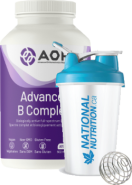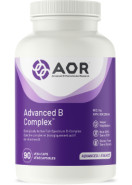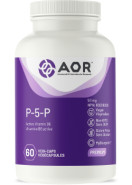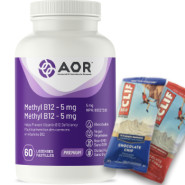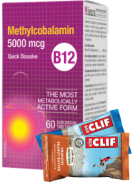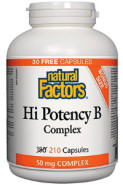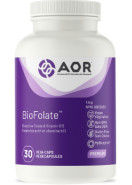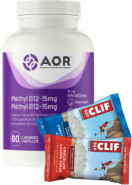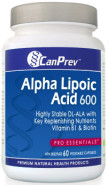Biotin - 5000mcg - 60 Caps - Naturopathic Labs
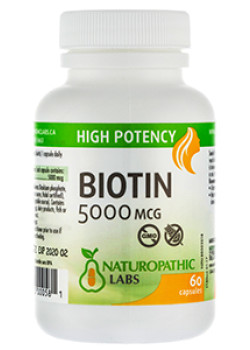
We're sorry, we no longer carry this item.
Check These out
Suggested, Similar, & Related Products:
Or, Shop our Latest Deals:
Shop Now >- 5000 mcg
- Biotin
Format
 Capsules
Capsules
60 Caps
Dosage
Adults take 1 capsule daily with a meal.
Important Information
Contains no added gluten, nuts, eggs, dairy products, fish or shellfish, soy, wheat, or yeast.
Consult a health care practitioner prior to use if pregnant or breastfeeding.
- A factor in the maintenance of good health
- Helps the body to metabolize carbohydrates, fats and proteins
- Plays a critical role in skin health
- Promotes normal immunity
Related Videos
No Related VideosArticles by a naturopathic doctor.
Naturopathic Labs Canada is an exclusive natural supplement brand to National Nutrition. They offer high-quality supplements for a fraction of the cost compared to the competitors. Naturopathic Labs supplements include Omega-3, Serrapeptase, 5-HTP, Biotin, B Complex, Collagen, Curcumin, EGCG Green Tea and more. Naturopathic Labs Clean Omega-3 Liquid contains a full 800mg of EPA and 500mg of DHA per dose (TG form) making it among the highest potency omega-3 supplements available. Buy Naturopathic Labs now at National Nutrition.ca
BIOTIN
Biotin will keep you looking as good as you feel by encouraging healthy hair growth and radiant skin...
Biotin is a water soluble, sulphur-containing member of the B complex. Biotin is most well known for its promotion of healthy hair and skin. Cradle cap in infants and male pattern baldness may be related to low levels of biotin. Biotin also helps the functioning of the sweat glands, bone marrow and nerve tissue.
It is a cofactor for chemical reactions that occur in the cell’s engine, the mitochondria. Therefore biotin is an important vitamin in the production of fatty acids and the metabolism of food substances and B vitamins.
All of the B vitamins work together and are best used by the body in a B complex, which is why many B complex supplements include a small dose of biotin in them. If additional supplementation of biotin is needed it should be taken in addition to a good B complex. Most B vitamins are water-soluble and any extra from large doses is flushed out of the body easily, therefore it's best to take lower dosages of the B complex several times a day than one larger dose. Spray or sublingual forms of B vitamins are easily absorbed, as are capsules - if your digestion is healthy, then the tablet form is usually suitable for most people.
The absorption of biotin is inhibited by the consumption of raw egg whites because the egg protein avidin binds to biotin in the intestine. Rancid fats or oils, antibiotics, sulfa drugs, estrogen, alcohol, food processing and saccharin also inhibit the use of biotin in the body.
SKIN HEALTH
Your skin is constantly exposed to stress from the environment such as sunlight, pollution, wind, and toxins. By taking the right supplements, you can improve the health of your skin and reduce premature aging...
The skin is the largest organ in the body. It has several important functions. It acts as a barrier to the external environment including harmful microbes, chemicals and radiation. It allows the exchange of water and some nutrients. It can eliminate toxins, minerals and other substances that have built up inside the body.
It modifies vitamins, like vitamin D, into more active forms. It helps to regulate body temperature. It is a monitor as to the health of our internal environment because the skin is one of the last organs to be nourished. Signs of deficiency often show in the skin before other areas of the body have been affected.
Healthy skin also impacts on our mental and emotional well-being because skin is one of the first things we notice when we see someone. Skin can be used to judge a person’s age, social status and health. Billions of dollars are spent each year in the cosmetics and personal hygiene industry. A great majority of this is to make our skin look healthier and more youthful. What can we do naturally to help our skin so that it will be healthy and maintain its youthful appearance?
Skin is made up of several layers. The epidermal outer layer contains keratinized skin cells. It is the fibrous, protective shield for the body. The epidermis is firmly attached to inner layers of irregular connective tissue, the dermis. The dermis contains collagen, the structural support, and elastin, the stretchy support. Only the dermis has blood supply, nutrients reach the outer skin layers only by diffusion.
Degeneration of the skin occurs for several reasons:
-Free radical damage
-Lack of moisture (water) and oil
-Lack of nutrients and protein
Free radicals are unstable molecules that in their bid to become more stable must bump into healthy cells and cause damage. This can cause cell death, alterations in genetic material and autoimmune reactions to damaged cells. Ultraviolet radiation from the sun is the major contributor of free radicals that build up in the skin.
Skin oil is produced in the sebaceous glands. Its job is to coat the skin and prevent too much water from evaporating off the skin’s surface. Water keeps the skin hydrated. The connective tissue in the dermis is composed of elastin and collagen. These substances need a supply of protein and nutrients to repair damage and form new tissue when needed.
Sunlight, poor diet, dehydration, environmental factors, chemicals, medications, hygiene routines, stress and disease elsewhere in the body all decrease the body’s ability to maintain healthy skin. This can result in poor skin quality, occurring in the following conditions:
Acne is a common skin complaint is characterized by pimples, blackheads, and whiteheads. It affects most of our society at some point in their life.
Nutritional deficiencies, exposure to environmental toxins, stress, genetics, hormonal imbalances and some pharmaceutical drugs can cause acne. It is rarely caused by uncleanliness.
Dermatitis means inflammation of the skin. It is a general term that describes skin that scales, flakes, thickens, and weeps, crusts and itches. The skin may also change colour. Eczema is a term used interchangeably with dermatitis. Atopic dermatitis is caused by allergies, temperature change, stress and infection. Contact dermatitis or allergic dermatitis is caused by skin contact with an irritating substance. Seborrheic dermatitis is dermatitis affecting the scalp or face.
Dry skin can be simple or complex. Simple dry skin occurs when the skin is deficient in natural oils and fails to hold water in skin cells. Oil normally lubricates the skin and acts as a barrier to avoid excessive evaporation of water from the upper layers of the dermis. Simple dry skin usually occurs in women under the age of 35. Complex dry skin lacks both oil and moisture. The protein components of the skin may be damaged from prolonged UV exposure. Complex dry skin tends to develop brown spots, fine lines and enlarged pores. Complex dry skin usually affects older adults and is associated with aging.
Psoriasis is a common skin condition in which there is an increase in the production of skin layers. Thick, silvery scales surrounded by a red border characterize psoriasis patches. Triggers for psoriasis include hormonal changes, emotional stress, recurrent skin irritations, surgery, cuts, medications, poor diet, and poor digestive function and alcohol consumption.
Rosacea is a chronic skin condition in which acne-like pustules form in people over the age of 30. It is caused by an increase in sebum production. The first stage involves a reddening of the skin on the cheeks and nose, and later, the forehead and chin. Acne forms and pustules are visible. Tiny blood vessels can be seen below the skin’s surface. Underlying causes can be toxin accumulation, improper nutrition, insufficient stomach acid, food sensitivities, liver or gallbladder dysfunction or hypertension. Rosacea outbreaks are worsened by stress, worry, sunlight, heat and the consumption of coffee and alcohol.
Wrinkles form when the skin loses its elasticity and maintains a permanent crease. It usually happens around the eyes, cheeks and lips because these areas repetitively form facial expressions like smiling or frowning. The most important factor in the development of wrinkles is sun exposure. Damage from UVA rays, which are present all year round, can attribute to up to 90 percent of skin aging. Other factors that contribute to wrinkled skin are nutritional status, habitual facial expressions, stress, skin care, environmental pollutants, smoking and heredity.
- Reviews
- POST A NEW REVIEW
















